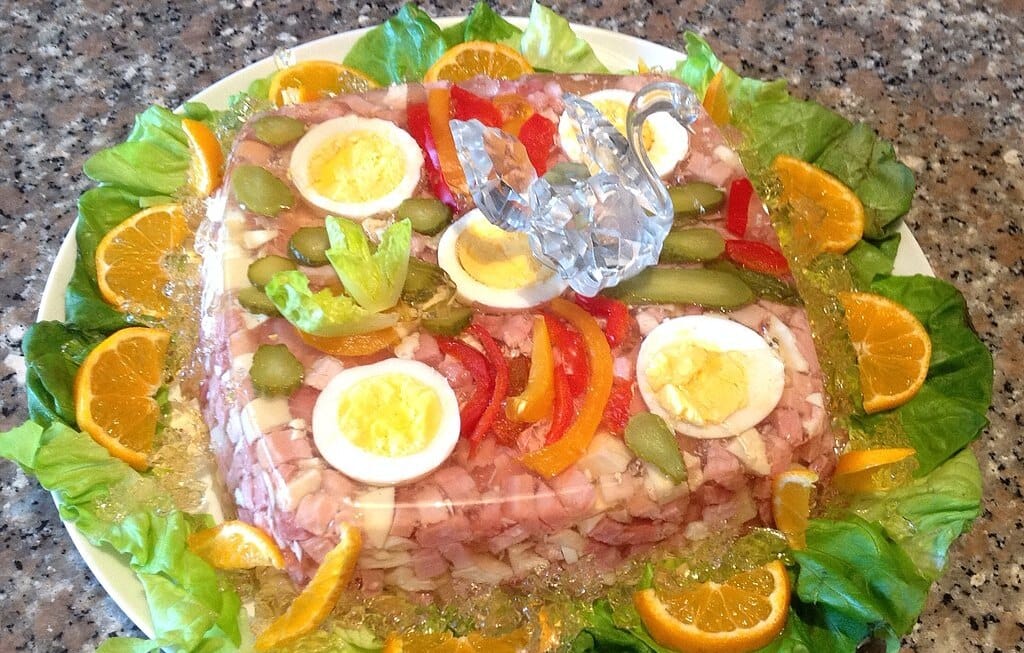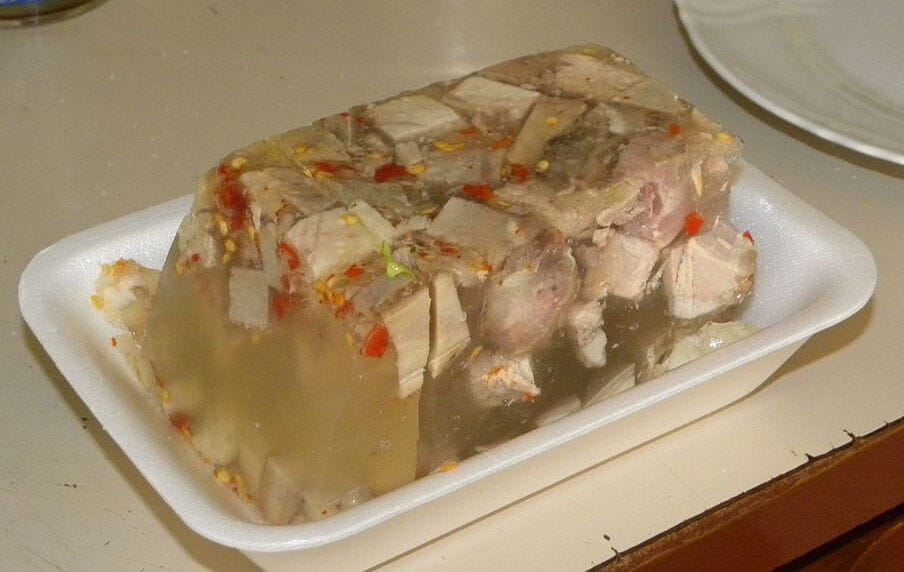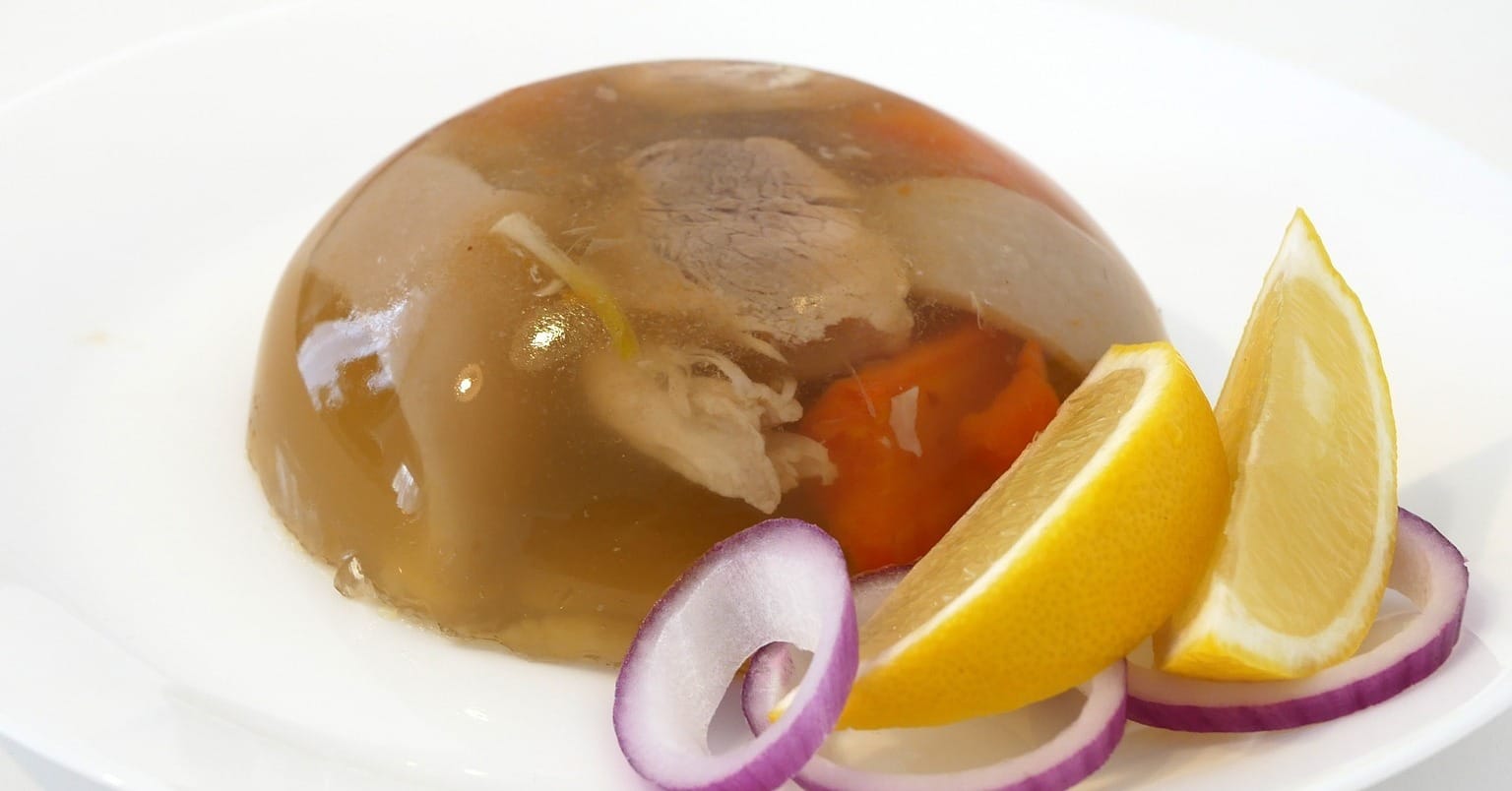There is an opinion that jellied meat promotes rapid healing of bones in case of fractures. We decided to check if this is true.
Articles about the benefits of jellied meat for fractures and other bone problems can be found in the media (for example, they wrote about it “Arguments and facts", "Komsomolskaya Pravda", "Channel One") And publications about a healthy lifestyle, blogs O medicine. Internet users are discussing this topic on forums, V social networks, in services questions And answers.
Aspic (aspic, jelly) is a thick meat broth, which, when cooled, hardens and turns into jelly with pieces of meat (or any other filler) inside. Solidification occurs thanks to collagen, which is released from the meat during cooking. It is mainly found in connective tissues, ligaments, cartilage, bones and skin, so cooks advise choose these parts for the jellied meat, not the fillet (it can be added separately later). Sometimes, for better hardening, ready-made jellied meat is added gelatin, which is essentially heat-treated collagen obtained from beef or pork.
Collagen is the main structural protein in human ligaments, cartilage, and connective tissue. He really important for bone health and strength. That's why pharmaceuticals offers a huge amount food additives with this substance. However, the collagen we eat not digestible by our body, but is broken down into amino acids during digestion. That is, consuming foods or supplements with collagen does not increase the level of collagen in our body. Besides, research, which confirm the supposed effectiveness of such additives, in most cases funded pharmaceutical companies, which creates a conflict of interest and undermines confidence in the results.

It is worth noting that even those few (and not the most reliable) research, which confirm some effectiveness of taking collagen with food, do not promise quick action. From the beginning of its use to measurements and positive results passed from several months to a year. Most fractures grows together in six to eight weeks (although this depends on the complexity of the fracture and the specific bone: for example, the tibia can take up to 20 weeks to heal). So, if you started eating jellied meat expecting the positive effects of collagen after a fracture, most likely your body will cope with the damage faster than the collagen will begin to act.
However, collagen important to prevent fractures, if there is a lack of it, the bones become fragile. To strengthen them, you need to eat not collagen in its pure form, but productsthat stimulate its production in the body: chicken, fish, vegetables, fruits and berries, green salad, eggs, etc., that is, what contains key components collagen synthesis - the amino acids glycine and proline, as well as zinc, copper and vitamin C. In the list of such products you can also find meat broth (the key ingredient of jellied meat!), However, some researchers doubtthat it so effectively provokes the production of collagen in the body.
As we have already said, gelatin contained in jellied meat, when digested, decomposes into amino acids, which, in turn, provide collagen synthesis. It would seem logical that in this case gelatin should actually directly affect the production of collagen in the body. However, it's not that simple. The fact is that the body itself defineswhere to direct these amino acids, depending on its current needs.
Sports doctors recommend to his wards use gelatin for recovery from tendon and bone injuries, however noteThat this alone is not enough to trigger collagen synthesis, you also need a special set of exercises adapted for each specific injury.

At the same time, for successful recovery after a fracture necessary a complete diet rich in proteins. In 100 g gelatin contained about 85 g of protein. For comparison, in 100 g chicken fillet contains 32 g of protein, and 100 g beef - 23 g. If we could consume 100 g of dry gelatin at a time, it could really be a miracle product, but this is impossible. If look on protein content in aspic, which can buy in Russian stores, it turns out that it does not exceed 11 g per 100 g of product (and more often - even less). So in terms of a protein-rich diet, chicken or beef is much more effective.
However, there are studies that confirm the effectiveness of dietary collagen in joint diseases (For example, osteoarthritis or pain in athletes due to increased loads) and osteoporosis (diseaseassociated with a lack of calcium in the bones). But they again talk about long-term therapeutic use. In case of fractures specialists recommend use, in addition to protein, products, rich in calcium, vitamins C and D, iron, potassium: lean meat, fish, dairy products, legumes, etc. We could not find advice in any authoritative source to add jellied meat, gelatin or collagen-containing supplements to the diet.
Thus, collagen, necessary for the health of bones, ligaments and joints, is not absorbed from food, but is produced by the body itself. Its synthesis actually involves amino acids, which the body can obtain from gelatin (one of the forms of collagen) in jellied meat, but whether they will be used for the production of its own collagen or for other needs of the body cannot be predicted. In addition, the scientific community has not yet reached a consensus on the effectiveness of dietary supplements with collagen; existing research is insufficient for this. Gelatin contains a lot of protein, which is beneficial for bones (including fractures), but it cannot be consumed in large quantities. If you look at the protein content in jellied meat sold in stores, it turns out that it is much inferior to ordinary meat or chicken. In addition, even those studies that indicate the benefits of collagen speak of it as a therapeutic agent, and not at all as an emergency aid for injuries and fractures. So you can include it in your diet if you like it, but you shouldn’t count on it as an effective medicine in such cases.
Mostly not true
Read on the topic:
- Is it true that vitamin C helps cure colds?
- Is it true that blueberries improve vision?
- Truths and myths about vitamin D
- Is it true that garlic protects against colds and flu?
If you find a spelling or grammatical error, please let us know by highlighting the error text and clicking Ctrl+Enter.






